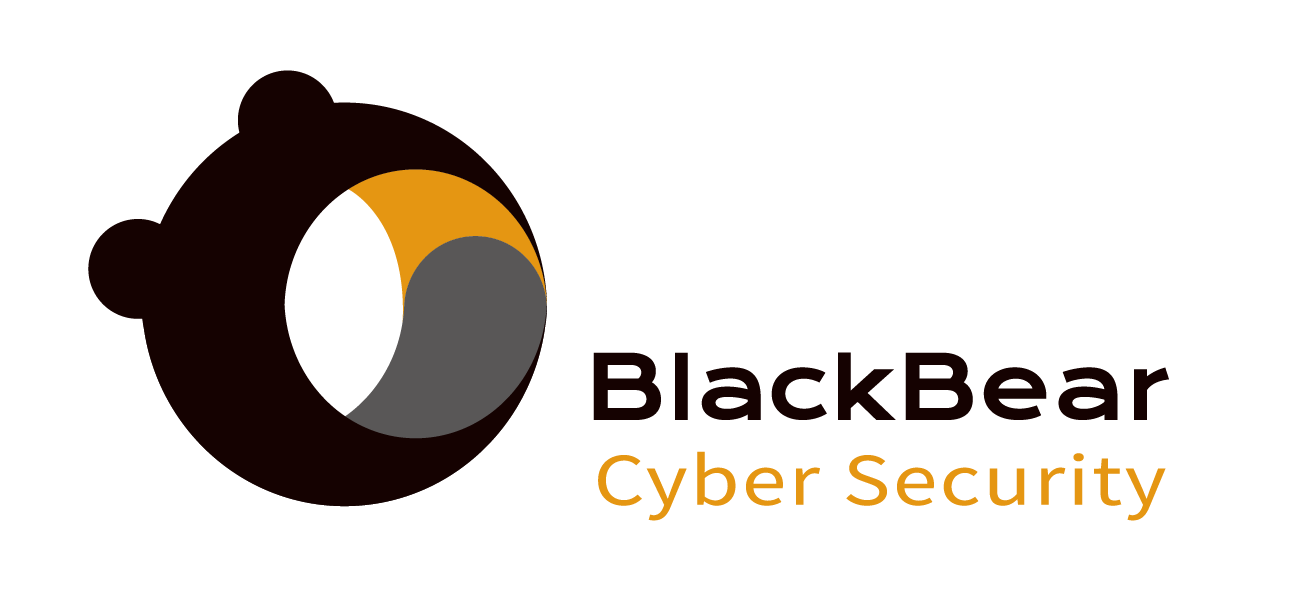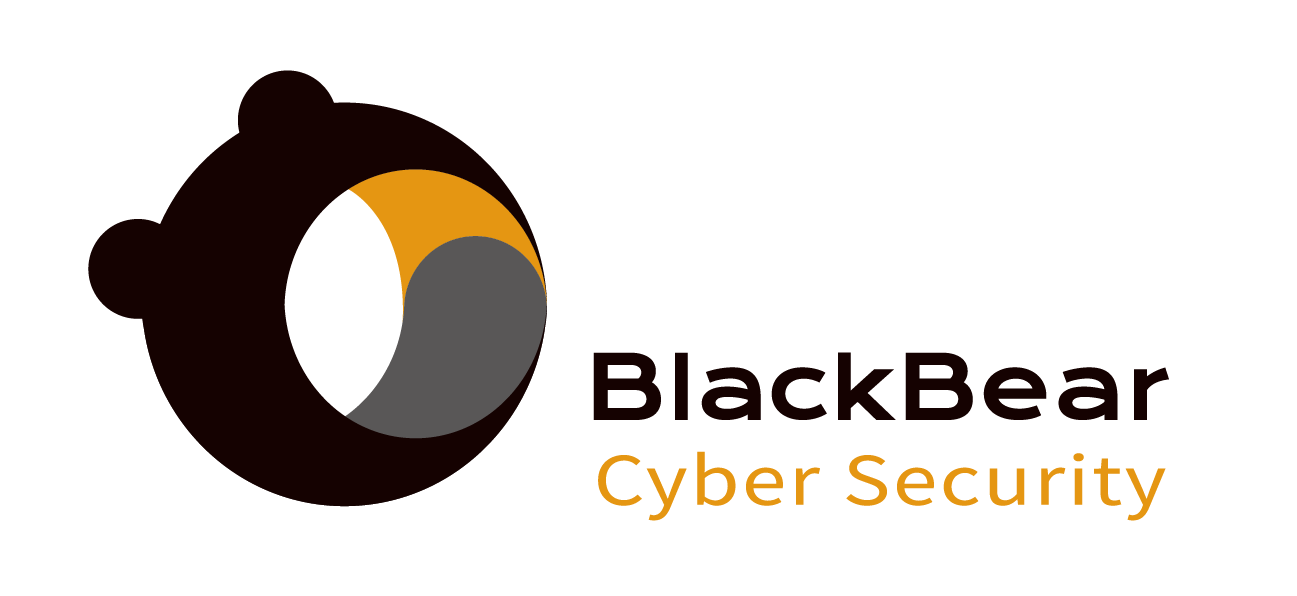What are Data Diodes? How a Key Component in Modern Cybersecurity Works
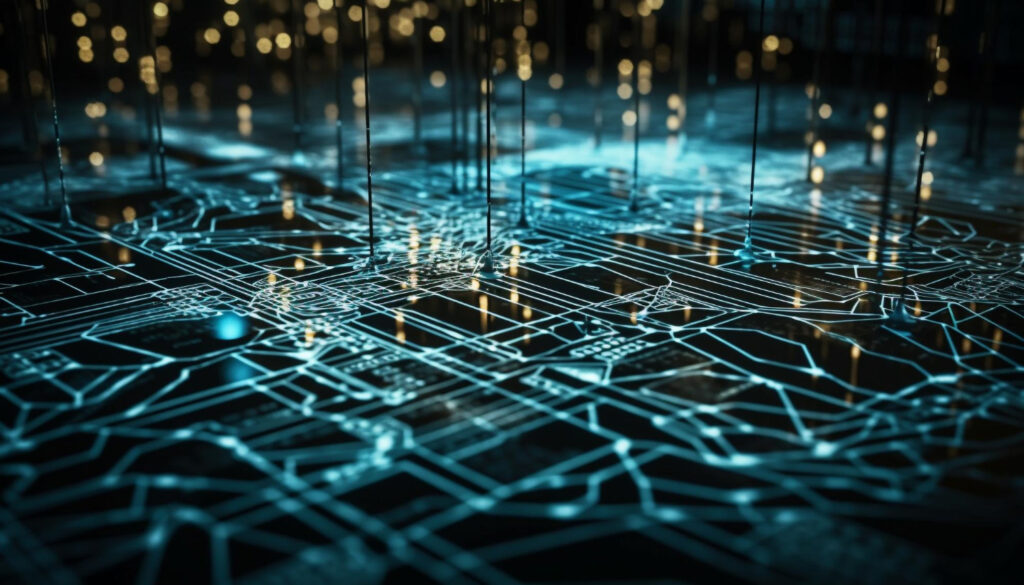
1. What is a Data Diode?
A data diode is a cybersecurity hardware designed to safeguard networks and infrastructure by only permitting data to travel in a single direction. It’s not just another piece of security hardware; it’s a game-changer. Unlike traditional security measures, data diodes offer a unique feature: unidirectional data flow. This means that data is impossible to have a return journey. They prevent data flow originating from the destination, which effectively eliminates the possibility of data leakage, unauthorized data retrieval, or cyber-attacks from this side.
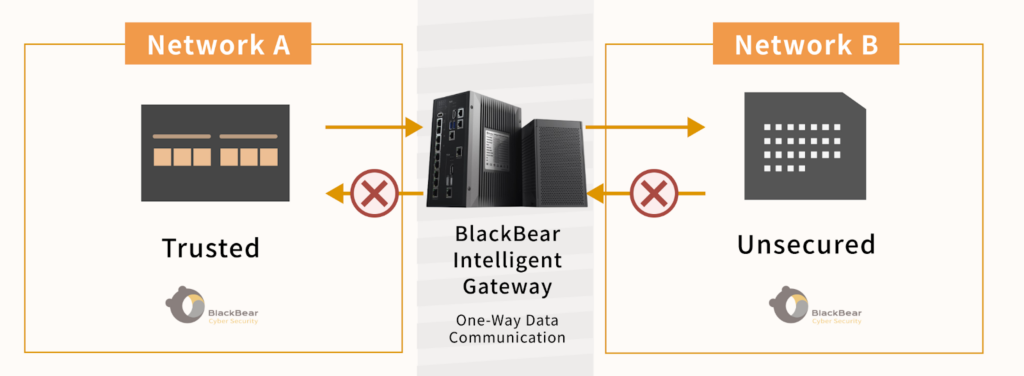
 See Also: Unidirectional Gateway: Types, Benefits & Applications
See Also: Unidirectional Gateway: Types, Benefits & Applications
1.1 How Do Data Diodes Work?
For data transfer, a route must have both a transmitting end and a receiving end. Imagine a lighthouse guiding ships with its light, allowing communication between the shore and the vessel. In standard two-way communication, the ship can signal back to the lighthouse. However, if the ship omits a light source, people on the shore remain unaware of the ship’s status. During secret or critical missions, this prevents ship information from being discovered.
Data diodes operate like this scenario, employing optical or electrical elements like fiber optics, LEDs, and electronic circuits to enable one-way data transfer between networks. BlackBear Cyber Security utilizes an innovative FPGA method, permitting only whitelisted traffic in one direction and blocking any traffic from the other – ensuring a secure and unidirectional flow of data.
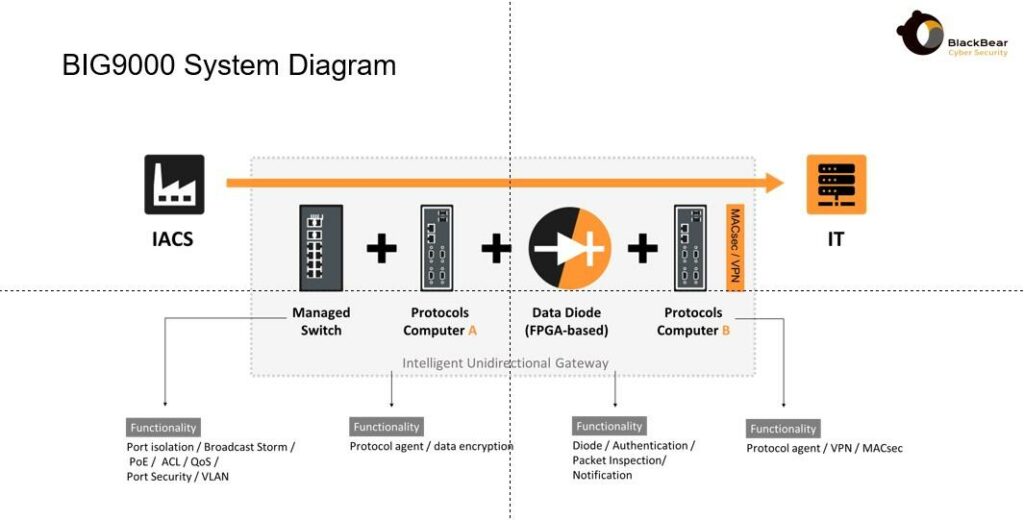
1.2 Data Diodes vs. Firewalls
Data diodes and firewalls both serve security functions in network environments, yet they fundamentally differ in their technological approaches and mechanisms. Firewalls are security software-driven solutions. They function based on pre-established routing rules to determine whether data can move between the two sides. Data diodes, hardware-based solutions, separate two networks by isolating them at the physical layer – from secure sites to open networks.
Here’s a table to look at it more clearly:
| Feature/Aspect | Firewalls | Data Diodes |
| Definition | A security solution that separates two networks or systems, allowing restricted bi-directional data flow based on predefined routing rules. | A security device that isolates two networks at the physical layer, permitting only a unidirectional flow of data. |
| Operation | Operates based on pre-established routing rules determining data movement between two sides. | Operates by isolating networks at the physical layer. Proxy servers in OT and IT run independently, sending OT data to the IT side without the possibility of reverse flow. |
| Vulnerabilities | Being software-driven, they can be susceptible to risks when poorly configured or containing intrinsic weaknesses. | Reduced system flexibility but increased security. Even if an IT proxy server is compromised, assets or systems on the OT side remain protected. |
| Suitability | Best for scenarios requiring dynamic network interactions and real-time adjustments, like corporate settings or systems handling less-sensitive information. | Suited for vulnerable network segments where an additional layer of security is crucial. Analogous to the air-gap approach but permits real-time data transmission. |
| Data Flow Direction | Bi-directional. | Unidirectional. |
| Primary Advantage | Flexibility and widespread adoption. | Enhanced security levels, especially for crucial network segments. |
While firewalls and data diodes are both integral to network security, their strengths and weaknesses make them suitable for different scenarios. Firewalls offer flexibility and widespread adoption but come with inherent software vulnerabilities. Therefore, they are best used in environments where dynamic network interactions and real-time adjustments are essential, such as corporate settings or less-sensitive information systems.
In contrast, data diodes provide robust security by physically isolating networks, albeit at the cost of reduced system flexibility. They work well in critical infrastructures or high-security settings where data transfer directionality is fixed and paramount, like military applications or nuclear power plants.
For more detailed insights, head over to this article which provides a comprehensive comparison.
 See Also: An In-depth Look at Hardware-based Cybersecurity
See Also: An In-depth Look at Hardware-based Cybersecurity
2. Benefits of Data Diodes
Data diodes offer numerous benefits, from secure file transfer to regulatory standards compliance. They are powerful tools for organizations looking to enhance their cybersecurity measures. Here are some of the advantages of using data diodes as a solution:

2.1 Secure File Transfer
One of the primary benefits of data diodes is their ability to ensure secure file transfer by effectively eliminating the risk of data leakage or unauthorized access. This concept of secure data transfer is a key feature of data diodes, making them an essential tool for organizations that prioritize data security.
Secure file transfer is not just about preventing data leaks; it’s also about ensuring data integrity. When data is transferred, it can be corrupted or altered in transit.
2.2 Network Separation
Separation not only upholds data integrity but also safeguards sensitive information from potential threats. This becomes crucial in environments where multiple networks coexist. For instance, within a corporate setting, an organization might maintain distinct networks for various departments or functions. Such segmentation ensures that data from one segment doesn’t inadvertently spill over into another, thereby warding off potential data breaches.
2.3 Meet Regulatory Standards
Data diodes also help organizations meet regulatory standards for data security, such as the North American Electric Reliability Corporation Critical Infrastructure Protection (NERC-CIP) standards and the National Institute of Standards and Technology (NIST) frameworks. These regulations require businesses to protect sensitive information, restrict data access, and manage network traffic.
In today’s regulatory environment, compliance is not just a legal requirement; it’s also a business necessity. Non-compliance with standards can result in hefty fines, reputational damage, and loss of customer trust. Data diodes help organizations avoid these pitfalls by providing a robust and reliable solution for data security.
 See Also: Enhancing Resilience: Solutions for Critical Infrastructure in Cybersecurity
See Also: Enhancing Resilience: Solutions for Critical Infrastructure in Cybersecurity
3. What are Data Diodes used for?

Data diodes have a wide range of applications, from IoT sensors to industrial control systems, demonstrating their versatility and effectiveness in various contexts. Here are some examples where data diodes can be applied:
3.1 IoT systems
In the realm of IoT networks, data diodes play a crucial role in ensuring data security. They protect the data generated by these equipments, ensuring it can be safely transferred without the risk of interception or unauthorized access.
IoT equipment, for example sensors, generate a vast amount of data, much of which is sensitive or confidential. This data needs to be protected, both in transit and at rest. Data diodes provide this protection by ensuring a one-way flow of data, preventing any potential data leaks or unauthorized access.
 See Also: Securing the Future: A Comprehensive Guide to OT Cybersecurity
See Also: Securing the Future: A Comprehensive Guide to OT Cybersecurity
3.2 Infrastructure Security
In infrastructure cybersecurity, data diodes play a pivotal role in safeguarding sensitive operations. Their applications span across various sectors, including energy, where they protect critical power grids, and water treatment facilities, where they ensure the integrity of control systems.
In transportation, data diodes secure communication networks in airports and railway systems. Additionally, they are vital in telecommunications and manufacturing, where uninterrupted, secure data flow is crucial for operational continuity and safety. By implementing data diodes, these sectors significantly enhance their defense against cyber threats.
 See Also: What is Industrial Cybersecurity: Control System & Solutions
See Also: What is Industrial Cybersecurity: Control System & Solutions
3.3 Video Streaming Security
Video streaming involves the transfer of large amounts of data in real-time. Moreover, video streaming devices, such as CCTV cameras, can be vulnerable to cyber threats.
For instance, there have been incidents where CCTV systems installed had backdoor programs and software vulnerabilities that made the devices prime targets for hackers. Applications of data diodes can fortify video streaming security, ensuring that video streams are securely transferred without the risk of interception. This is particularly important given the unique challenges of securing video streaming data, which data diodes effectively address.
3.4 HTTP Mirror
Data diodes are also used in the context of an HTTP mirror, a system that replicates data from one server to another. They ensure that the replicated data can be securely transferred, enhancing the overall security of the HTTP mirroring process.
HTTP mirroring is a common technique used in web hosting and content delivery. It involves creating a copy of a website or web content on a different server, allowing users to access the content from multiple locations. Data diodes enhance the security of this process, preventing data theft or manipulation from external origins.
 See Also: BlackBear Case Study
See Also: BlackBear Case Study
4. Explore BlackBear Data Diodes for Your Cybersecurity Needs
Our tailor-made solutions act as a fortress for your assets, ensuring uninterrupted operations and shielding critical equipment through unidirectional communication at OSI layer 1. Also, create a secure Subnet where critical assets seamlessly communicate with each other while maintaining a robust physical separation from upper networks. Finally, unlock the power of secure communication at the System level, connecting critical assets and sub-systems seamlessly up to the cloud.
Other noticeable value-added features include last-mile data encryption through IPsec, OpenVPN, and MACsec (hardware component), PoE PSE with 802.3 af/at support, high-availability power with a supercapacitor after power loss, and reverse diode support for input commands from the IT/unsecured network.
Choose BlackBear’s data diodes for unparalleled security in your utility operations!
Success Stories
Fortifying Offshore Operations: Cybersecurity for Oil and Gas Platforms

Safeguarding flow computers on offshore oil and gas platforms is crucial to prevent malicious attacks leading to inaccurate measurements, disruptions, safety hazards, and regulatory violations.
BIG ensures security with a one-way data diode and Modbus TCP support, allowing data flow only from the flow computer to the uplink. This design guarantees secure data collection, protecting processes from external tampering or errors, and providing enhanced cybersecurity.

PLCs with embedded systems are vulnerable to cyber threats, risking significant financial losses, averaging $4.35 million per attack.
With IEC 62443 compliance, industrial-grade switching, FPGA-based data diode, and MACSec-encrypted output data at 1Gbps, BIG is the perfect and reliable cybersecurity solution, tailored for harsh environments.
Robust and secured networking solutions for substations

National-scale blackout risks from cyber-attacks highlight the need for robust cybersecurity, emphasizing low-maintenance data diode solutions for substations’ physical defense in the power grid.
Our data diodes enhance cybersecurity in substations by employing MACSec for secure communication and adhering to IEC62443 standards, also IEEE 802.1p/q for traffic optimization, and IEEE 1588v2 for time synchronization, ensuring impeccable protection in critical environments.
These real-world examples showcase the diverse applications of BlackBear data diodes and their effectiveness in protecting critical infrastructure across various industries. Contact us today to learn how BlackBear data diodes can be customized to meet your specific cybersecurity needs!
Your Network Security is Our Duty!
